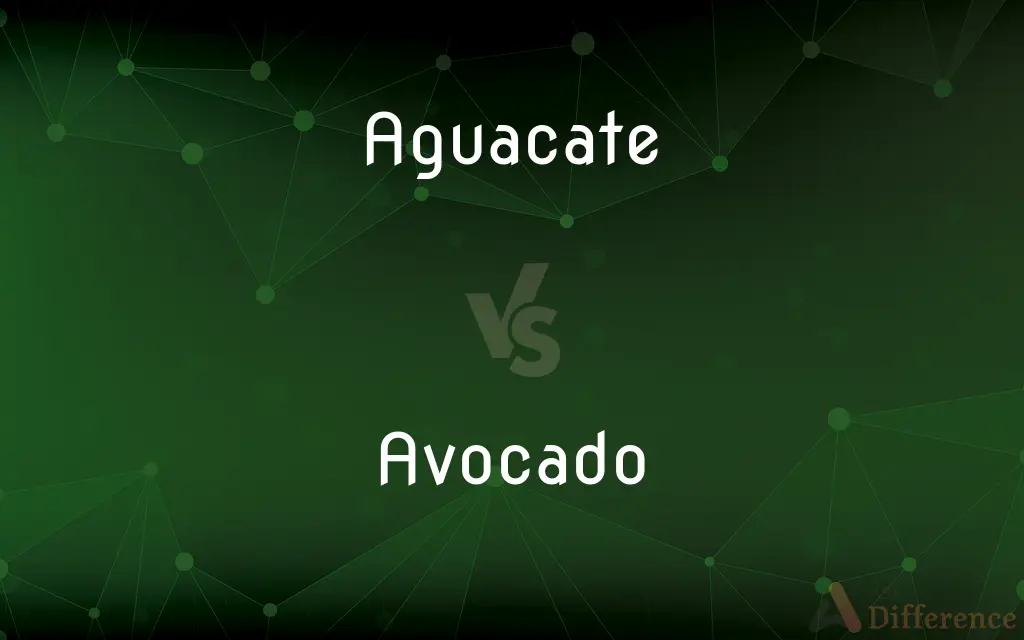Aguacate vs. Avocado — What's the Difference?
Edited by Tayyaba Rehman — By Fiza Rafique — Updated on April 27, 2024
Aguacate and avocado refer to the same fruit; "aguacate" is the Spanish term, while "avocado" is the English equivalent, commonly used in global trade.

Difference Between Aguacate and Avocado
Table of Contents
ADVERTISEMENT
Key Differences
Aguacate is the term used primarily in Spanish-speaking countries to refer to a fruit known for its buttery texture and nutrient-rich profile, originating from South America. Whereas, avocado is the English term adopted from the Spanish 'aguacate', derived from the Nahuatl word "ahuacatl". Both terms refer to the same fruit but highlight the linguistic variations in different regions.
In the culinary world, the use of the term aguacate remains strong in Latin American cuisines, often featured in traditional dishes. On the other hand, avocado has become a global staple found in a variety of international dishes, such as sushi and salads, indicating its widespread culinary adoption beyond Hispanic communities.
Regarding linguistic influence, aguacate shows the rich cultural and linguistic heritage of the Americas, being a direct borrowing from Spanish. Conversely, avocado represents how the fruit has been integrated and normalized within the English language, showing less of its etymological roots.
In terms of marketing and commerce, products in the United States and much of Europe are likely to be labeled as avocado. Whereas in Spanish-speaking markets, the labeling will favor aguacate, aligning with local language preferences.
The term aguacate connects people with Hispanic heritage and the original naming traditions of the Americas. On the other hand, avocado can sometimes reflect a more globalized or Anglicized view of the fruit, often disconnected from its indigenous origins.
ADVERTISEMENT
Comparison Chart
Language Origin
Spanish
English (from Spanish)
Etymology
From Nahuatl "ahuacatl"
From Spanish "aguacate"
Usage
Preferred in Spanish-speaking regions
Preferred in English-speaking regions
Culinary Connection
Strong in traditional Latin American dishes
Broadly used in diverse international cuisines
Cultural Significance
Maintains indigenous linguistic roots
Reflects globalized food culture
Compare with Definitions
Aguacate
The Spanish word for avocado, emphasizing its cultural and linguistic roots.
In her grocery list, she wrote down aguacate, not avocado.
Avocado
Marketed extensively in non-Spanish-speaking countries.
The supermarket has a special on avocados this week.
Aguacate
Can be used interchangeably with "avocado" in bilingual contexts.
The menu described the dish as featuring aguacate (avocado).
Avocado
A fruit characterized by its pear shape, green skin, and nutritional value, especially high in healthy fats.
She spread mashed avocado on her morning toast.
Aguacate
A tropical fruit with green, buttery flesh and a large pit, commonly used in Latin cuisine.
He added ripe aguacate to the salsa to enhance its creaminess.
Avocado
Integral to various global cuisines, beyond its origins.
Avocado rolls are a staple in American sushi restaurants.
Aguacate
A symbol of agricultural importance in many Latin American countries.
Aguacate farming is a significant industry in Mexico.
Avocado
Commonly associated with modern health trends and diets.
Avocado toast has become a popular healthy breakfast option.
Aguacate
Often used in traditional dishes like guacamole.
For authentic guacamole, always start with fresh aguacate.
Avocado
Often represents modern culinary innovation.
Chefs use avocado in smoothies for a creamy texture.
Aguacate
The avocado.
Avocado
The avocado (Persea americana), a tree likely originating from south-central Mexico, is classified as a member of the flowering plant family Lauraceae. The fruit of the plant, also called an avocado (or avocado pear or alligator pear), is botanically a large berry containing a single large seed.
Aguacate
(archaic) avocado
Avocado
A pear-shaped fruit with a rough leathery skin and smooth, oily edible flesh
Serve with slices of avocado
A salad of avocados and oranges
Aguacate
A pear-shaped tropical fruit with green or blackish skin and rich yellowish pulp enclosing a single large seed
Avocado
The tropical evergreen tree that bears the avocado, native to Central America and widely cultivated elsewhere.
Avocado
A tropical American tree (Persea americana) having oval or pear-shaped fruit with leathery skin, yellowish-green flesh, and a large seed.
Avocado
The edible fruit of this tree. Also called alligator pear, avocado pear.
Avocado
A dull green.
Avocado
The large, usually yellowish-green or black, savory fruit of the avocado tree.
Avocado
The avocado tree, Persea americana, of the laurel family.
Avocado
A dark chartreuse colour, like the colour of the skin of an avocado.
Avocado
Of a dull yellowish-green colour.
Avocado
The pulpy fruit of Persea gratissima, a tree of tropical America. It is about the size and shape of a large pear; - called also avocado pear, alligator pear, midshipman's butter.
Avocado
A pear-shaped tropical fruit with green or blackish skin and rich yellowish pulp enclosing a single large seed
Avocado
Tropical American tree bearing large pulpy green fruits
Avocado
Of the dull yellowish green of the meat of an avocado
Common Curiosities
Are aguacate and avocado the same fruit?
Yes, aguacate and avocado refer to the same fruit.
Why do some regions prefer the term aguacate over avocado?
Some regions prefer aguacate due to linguistic and cultural reasons, particularly in Spanish-speaking areas.
Which term is more common in global commerce?
Avocado is more common in global commerce, particularly in English-speaking markets.
Can the terms aguacate and avocado be used interchangeably in recipes?
Yes, aguacate and avocado can be used interchangeably as they refer to the same fruit.
Is there a nutritional difference between aguacate and avocado?
There is no nutritional difference; the terms refer to the same fruit.
How did the term avocado come into English usage?
The term avocado came into English from the Spanish word aguacate, itself derived from the Nahuatl word ahuacatl.
What are the main culinary uses of aguacate/avocado?
Aguacate/avocado is widely used in salads, sandwiches, guacamole, and as a topping in various dishes.
Which term should I use if cooking traditional Latin American dishes?
Use aguacate to refer to the fruit when cooking traditional Latin American dishes for authenticity.
What is aguacate known as in English?
Aguacate is known as avocado in English.
What are some health benefits of eating aguacate/avocado?
Aguacate/avocado is high in healthy fats, fiber, and vitamins, beneficial for heart health and weight management.
What impact has the popularity of avocado had on its countries of origin?
The popularity of avocado has boosted the agricultural economy in its countries of origin but also led to environmental and social challenges.
Do aguacate and avocado have the same cultural significance?
The cultural significance can vary; aguacate has a deeper connection in Latin American cultures, whereas avocado is seen more as a global commodity.
Are there any specific dishes that originated using aguacate?
Yes, guacamole is a famous dish that originated using aguacate.
Is there any specific region known for aguacate farming?
Mexico is particularly renowned for its aguacate farming.
What is the etymology of aguacate?
Aguacate comes from the Nahuatl word ahuacatl, which was adapted into Spanish.
Share Your Discovery

Previous Comparison
Chitterlings vs. Tripe
Next Comparison
Angora vs. MohairAuthor Spotlight
Written by
Fiza RafiqueFiza Rafique is a skilled content writer at AskDifference.com, where she meticulously refines and enhances written pieces. Drawing from her vast editorial expertise, Fiza ensures clarity, accuracy, and precision in every article. Passionate about language, she continually seeks to elevate the quality of content for readers worldwide.
Edited by
Tayyaba RehmanTayyaba Rehman is a distinguished writer, currently serving as a primary contributor to askdifference.com. As a researcher in semantics and etymology, Tayyaba's passion for the complexity of languages and their distinctions has found a perfect home on the platform. Tayyaba delves into the intricacies of language, distinguishing between commonly confused words and phrases, thereby providing clarity for readers worldwide.













































